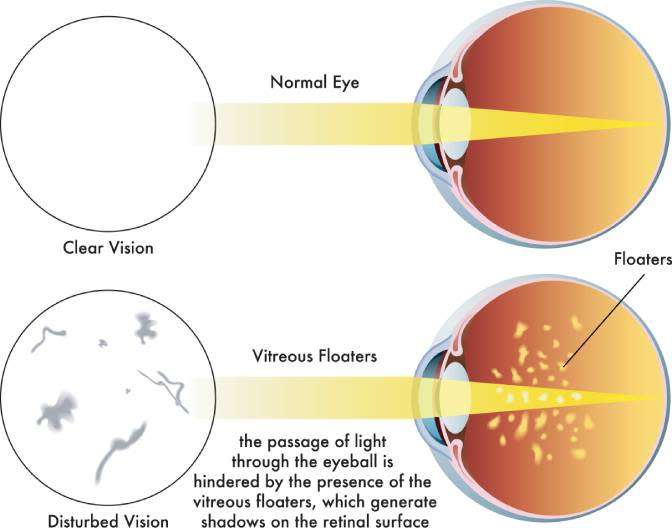50% OFF a Complete Pair of Glasses
*Restrictions apply. Click here for details.
Eye Floaters Treatment
Eye Floater Treatment at Nationwide Vision

Eye floaters don’t always require treatment but they can impair your vision and be a symptom of other underlying eye problems. Eye floaters are spots in your vision that may drift about when you move your eyes and can dart away when you look at them directly. Eye floaters are usually caused by age-related changes in the eyes, and often disappear on their own in weeks or months. The doctors of Nationwide Optometry specialize in diagnosing and treating eye floaters and restoring your peace of mind.
Find Eye Floater Treatment From the doctors of Nationwide Optometry

The doctors of Nationwide Optometry can diagnose and treat eye floaters at our locations serving Arizona.
What Are Eye Floaters?
An eye floater is a transparent, small, curved object that you may see in your field of vision. An eye floater may take on the appearance of a cobweb, worm, circle, line, dot, spot, or speck and can be of various shapes and sizes. The spots are often caused by small flecks of protein or other matter that become trapped in your eye. An eye flasher is a momentary streak of light in your field or vision. Flashes may indicate more serious vision problems, including posterior vitreous detachment or a retinal tear. Eye floaters are caused by a variety of factors:
Natural as we age
Inflammation in the back of the eye
Bleeding in the eye
Torn retina
Eye surgeries and medications
Floaters are common, especially as we age. If the issue persists, you should schedule an appointment with the Arizona eye doctors of Nationwide Optometry.
How Does An Eye Doctor Diagnose Eye Floaters?
The doctors of Nationwide Optometry use an instrument called an ophthalmoscope to examine the central and peripheral retina. When used, this can detect floaters or flashes. Your eyes may also be dilated during the exam so that your eye doctor can get a clear look at the inside of your eye. This allows them to see floaters you have and check on your retina.
Risk Factors for Eye Floaters
Eye floater risk factors include being over the age of 50, being nearsighted, having recently experienced eye trauma, having recently undergone cataract surgery or having inflamed eyes or diabetic retinopathy. If you have any of these risk factors, it is a good idea to visit your local Nationwide Vision for an examination.
Eye Floater Treatment Options at Nationwide Vision

Time may be the only prescription or treatment necessary for floaters depending on the outcome from your eye exam. This is because eye floaters are commonly just an effect of aging and may go away on their own. Surgery where a small incision is made to remove the vitreous material or laser therapy may be recommended if your eye floaters impair your vision. At Nationwide Vision, our highly trained professionals will work with you to develop a customized treatment plan for you.
Frequently Asked Questions About Eye Floaters
Eye floaters are a common problem we see in patients at Nationwide Vision. Approximately 70% of the population experiences eye floaters or flashes in their lifetime.
Time may be all one needs to get rid of an eye floater. In serious cases, there are other treatment options you may wish to explore. A vitrectomy is an invasive surgery that can remove floaters from your line of vision. During this procedure, the surgeon will remove the vitreous and replace it with another solution. Laser therapy is another option for getting rid of eye floaters. Laser therapy is an option that may break up the floaters present and make them less noticeable to your line of sight and vision.
Most of the time eye floaters go away on their own, or, at least leave the field of vision on their own so people choose to ignore them. If the floaters are impairing your vision or may lead to a more serious eye condition, most optometrists will recommend a surgery called a vitrectomy, where the surgeon will remove the gel, along with the floaters in the eye. At home treatments may not make eye floaters go away but they can help reduce them to be less debilitating. A healthy diet that supports overall eye health rich in Zinc, Omega 3 fatty acids, vitamins A, C, and E may help. Floaters may be more noticeable under strain, so avoid staring at a computer screen for long hours, and take breaks from screen time. The opposite also holds true as well, so if you’re reading in a dim room, you may need to increase light to avoid eye strain.
